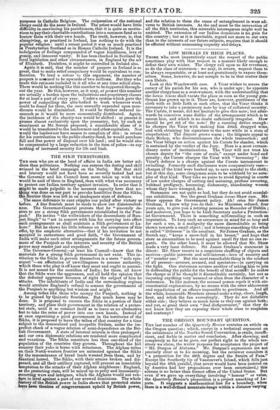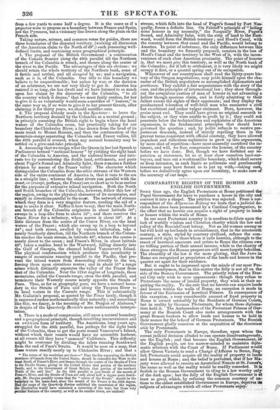THE OREGON BOUNDARY QUESTION.
THE last number of the Quarterly Review contains an article on the Oregon question ; which, except in a technical_ argument on the subsistence of the Nootka Sound Convention, is crude, insuffi- cient, and feeble in matter and conclusion. After showing, and completely as far as he goes, our perfect right to the whole ter- ritory we claim, the writer proposes for acceptance the project of " Mr. Dargan of Alabama." Mr. Dargan's expressions are not precisely clear as to his meaning, but the reviewer considers it ' a proposition for the 49th degree and the Straits of Fuca." Except the Southerly tip of Vancouver's Island, which fallsjust beyond the 49th parallel, (but never would have been insisted on by America had her propositions ever been entertained,) this scheme is no better than former offers of the United States. But even if we gave up everything involving " honour " or value, the Quarterly Review's proposition, is a project smacking of La- puta. It suggests a mathematical line for a boundary, when there is a well:mountainiange within a distance varying
from a few yards to some half a degree. It is the same as if a projector were to propose as a boundary between France and Spain, not the Pyrenees, but a visionary line drawn along the plain on the French side.
Taking nature, science, and common sense for guides, there are three boundaries of the disputed territory, (waiving all discussion of the American claim to the North of 49°,) each possessing well- defined limits, and containing some geographical principle. 1. The proposal of the British Government : a continuation of the Canada frontier along the 49th parallel till the Northern branch of the Columbia is struck, and thence along the centre of the river to the Pacific. The advantages of this are obvious : we should retain the whole territory of the Northern bank, some of it fertile and settled, and all occupied by us ; and a navigation, such as it is, of the Columbia. Our title to this boundary we believe to be unquestionable ; but unless by war, or the decision of an arbitrator, we are not very likely to get it. America has resisted it so long, she has dwelt and we have listened to so much upon her claims by the discovery of the Columbia, " to all the country which it drains," that we must fairly confess, for her to give it to us voluntarily would seem a sacrifice of " honour," in the same way as, if we were to give it to her present threats, after claiming it for thirty years, we should sacrifice ours.
2. The proposal already made in the Spectator: to leave the Worthern territory drained by the Columbia as a neutral ground; in principle assuming the British right to begin where the head waters of the Columbia cease, but practically taking for our boundary the Chickeeles River, a line drawn from the head of its main trunk to Mount Rainier, and then the continuation of the mountain-range separating the Columbia and Frazer vallies, till the 49th parallel is crossed, when any natural boundary may be settled on a give-and-take principle. 8. Assuming that we resign what the Queen in her last Speech to Parliament termed "national honour " by yielding the right bank of the Columbia to America, and the national honour and inte- rests too by surrendering the fertile land, settlements, and ports about Puget's Sound and Admiralty Inlet, there remains a further division by means of the Frazer valley. The character which distinguishes the Columbia from the other streams of the Western side of the entire continent of America is, that it runs to the sea in a straight line ; whereas the other rivers run parallel with the coast, or (xcept, perhaps, the Frazer) are so short as to be as useless for the purposes of extensive inland navigation. Both the North and South branches of the Columbia, however, follow this law of the' region, owing to the physical character of its mountains, and ramify in directions parallel to the coast. The network of streams which they form is a very singular feature, needing the aid of a map to make it clear. Suffice it here to say, that the main North- ern branch of the Columbia originates in about latitude 50°; sweeps in a loop-like form to above 52°; and there receives the Canoe River for a tributary, whose source is about 53°. At a little distance from the source of the Canoe River, are the head waters of the Frazer ; which also sweep up in a loop to beyond 840; and both rivers, swelled by various tributaries, take a nearly Southerly direction, till the Northern branch of the Colum- bia reaches the main stream, in latitude 46°, whence the course is nearly direct to the ocean ; and Frazer's River, in about latitude 49°, takes a sudden bend to the Westward, falling directly into the Gulf of Georgia, the channel behind Vancouver's Island. The physical conformation which produces this peculiarity is ranges of mountains running parallel to the Pacific, that pre- vent the inland waters from descending directly to the sea, forcing them upon circuitous routes ; and in about 51° a range arises which distinctly separates the valley of the Frazer from that of the Columbia. Near the 121st degree of longitude, these mountains, called the Cascade range, cross the 49th parallel, and terminate their Westerly course nearly opposite the Straits of Fuca. Thus, as far as geography goes, we have a natural boun- dary in the Straits of Fuca and along the Tuxpam River to its head waters in the Cascade range. This is substantially Mr. Gallatin's proposal, as quoted by the Times lately, though it is expressed rather mathematically than naturally ; and something like this, we fancy, is the meaning of Mr. Dargan of Alabama,* in despite of the Quarterly Review's more unfavourable interpre- tation.
4. There is a mode of compromise, still upon a natural boundary and a geographical principle, though involving inconvenience and an awkward form of territory. The Americans, long years ago, struggled for the 49th parellel, less perhaps for the right bank of the Columbia, than to get the ports round Vancouver's Island, without which their vessels would have no accessible harbour, at all events till they have " annexed" California. This difficulty might be overcome by dividing the inlets running Southward from the end of Fuca's Straits. It would be seen on a map, that thee waters ramify nearly up to Chickeeles River; and that a C- The terms of his resolution are these—" That the line separating the British provinces of Canada from the United States, should be extended due Westto the mast South of Frazer's River, and thence through the centre of the Straitsof Fuca to. the Pacific Ocean; giving to the United States that portion of the territory South, and to the Government of Great Britain that portion of the territory North of the said line." As the 49th parallel is just South of the mouth of Frazer's• River, and the Straits of Fuca are only about half a degree more South- erly, Mr. Dugan possibly means that the " centre of the Straits" should be the boundary on the main-land, since the month of the Frazer is the 49th degree. Had the maps of the Quarterly Review exhibited the mountains of the region, the illustration would have contained a correction of the text; but these very peculiar features of the country, as well as its smaller rivers, are omitted! stream, which falls into.the head of Puget's Sound by Fort Nas- qually, forms a definite line. On Falstaff's principle of " hiding mine honour in my necessity," the Nasqually River, Puget' Sound, and Admiralty Inlet, with the strip of land to the East- ward, would form the British territory; and Hood's Canal, with the country between that canal and the Pacific, would belong to America. In point of substance, the only difference between this and the boundary we formerly proposed, consists in the loss of Hood's Canal and the territory to the West of it, with the incon- venience of such close American proximity. The point of honour is, that we must give this territory, as well as the North bank of the Columbia ; for if left to settlement, it is very likely we might occupy it first, or a quarrel spring out of its occupation. Whosoever of our countrymen shall read the thirty-years his- tory of the Oregon negotiations, may pride himself upon the cha- racter of the British negotiators as accomplished diplomatists and gentlemen. They exhibit a fair acquaintance with the story of the case, and the principles of international law ; they show through- out the scrupulous caution of men of honour in not advancing a hollow though specious claim, and in fairly admitting to their fullest extent the rights of their opponents ; and they display the goodnatured toleration of well-bred men who encounter a civil but exorbitant and rather vulgar claimant. Here, however, the praise must end. They could have given no original research to the subject, or they were unable to profit by it ; they could not penetrate below the technicalities and sophistries of the American arguments, to the fundamental principles that should have governed the question ; and, by polite refusals to receive pre- posterous demands, instead of sternly repelling them in the gravest terms consistent with official courtesy, they have allowed impudent and ridiculous sophistries to grow up into arguments, by mere dint of repetition—have most assuredly sacrificed the in- terests, and will, we fear, compromise the honour, of the country before we have done. But, though we have forfeited our re- putation as statesmen, let us at least show ourselves land-sur- veyors, and turn out a workmanlike boundary, which shall secure us from intrusion, in such limits as politeness and gentlemanly insouciance may have forced us to put up with,—taking care, before we definitively agree upon our boundary, to make sure of the accuracy of our maps.



























 Previous page
Previous page